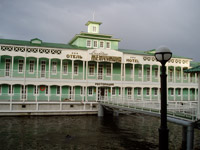

Yaroslavl (Russian: Ярославль) is a city in Russia, the administrative center of Yaroslavl region, located 250 km north-east of Moscow. The historical part of the city, a World Heritage Site, is located at the confluence of Volga and Kotorosl. It has a population over 600,000.
The city of Yaroslavl (said to have been founded in 1010 as an outpost of the Principality of Rostov Veliky, first mentioned in 1071) lies at the intersection of major highways, railroads and waterways. In the 17th century it was Russia's second largest city and, for a time (during the Polish occupation of Moscow in 1612), the country's de facto capital. Now Yaroslavl is an important industrial center (petrochemical plant, tyre manufacturing plant, diesel engines plant and many others).
Apart from the Spaso-Preobrazhensky (Transfiguration of the Saviour) Monastery the oldest churches in the city date back to the 17th century and belong to the so called Yaroslavl type (built of red brick, with bright tiled exteriors). Those of St. Nicholas Nadein and Elijah the Prophet have some of the Golden ring's most impressive frescoes.
There are many institutions for higher education: Demidov University, Polytechnical University, Ushinskiy Pedagogical University, Medical Academy, International University for Business and New Technologies, and others.
Military tuition institutions include the High Military Financial School and the High Anti-aircraft Missile School.
The city possesses a well-developed network of public transportation including buses, trolley-buses and tramway lines.
There is one railway bridge across the Volga River and one road bridge; the second road bridge across Volga is under construction.
There are two major passenger railway stations: Yaroslavl-Glavny and Yaroslavl-Moskovsky. Electric shuttle trains go to Danilov, Rostov, Alexandrov, Nerekhta, and Kostroma. Diesel shuttle trains go to Rybinsk and Ivanovo. Also many long-distance passenger trains go through Yaroslavl.

